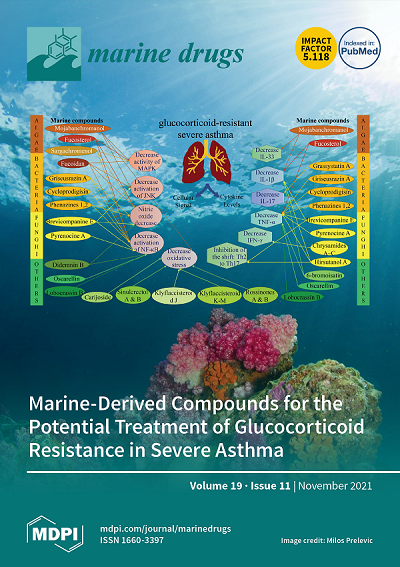Enantioselectivity in Vanadium-Dependent Haloperoxidases of Different Marine Sources for Sulfide Oxidation to Sulfoxides
IF 4.9
2区 医学
Q1 CHEMISTRY, MEDICINAL
引用次数: 0
Abstract
This study explores the reasons behind the variations in the enantioselectivity of the sulfoxidation of methyl phenyl sulfide by marine-derived vanadium-dependent haloperoxidases (VHPOs). Twelve new VHPOs of marine organisms were overexpressed, purified, and tested for their ability to oxidize sulfide. Most of these marine enzymes exhibited nonenantioselective behavior, underscoring the uniqueness of AnVBPO from the brown seaweed Ascophyllum nodosum and CpVBPO from the red seaweed Corallina pilulifera, which produce (R)- and (S)-sulfoxides, respectively. The enantioselective sulfoxidation pathway is likely due to direct oxygen transfer within the VHPO active site. This was demonstrated through molecular docking and molecular dynamics simulations, which revealed differences in the positioning of sulfide within AnVBPO and CpVBPO, thus explaining their distinct enantioselectivities. Nonenantioselective VHPOs probably follow a different oxidation pathway, initiating with sulfide oxidation to form a positively charged radical. Further insights were gained from studying the catalytic effect of VO43− on H2O2-driven sulfoxidation. This research improves the understanding of VHPO-mediated sulfoxidation and aids in developing biocatalysts for sulfoxide synthesis.不同海洋来源的依赖钒的卤代氧化酶将硫化物氧化成硫醚的对映选择性
本研究探讨了海洋生物钒依赖性卤代氧化酶(VHPOs)氧化甲基苯基硫醚的对映体选择性变化的原因。研究人员对 12 种新的海洋生物 VHPOs 进行了过表达、纯化,并测试了它们氧化硫化物的能力。这些海洋酶大多表现出非对映体选择性行为,突出了来自棕色海藻 Ascophyllum nodosum 的 AnVBPO 和来自红色海藻 Corallina pilulifera 的 CpVBPO 的独特性,它们分别产生 (R)- 和 (S)- 硫氧化物。对映体选择性硫氧化途径可能是由于 VHPO 活性位点内的直接氧转移。通过分子对接和分子动力学模拟证明了这一点,这些模拟揭示了硫化物在 AnVBPO 和 CpVBPO 中的位置差异,从而解释了它们不同的对映选择性。非对映选择性 VHPO 可能遵循不同的氧化途径,首先是硫化物氧化形成带正电荷的自由基。通过研究 VO43- 对 H2O2 驱动的硫氧化作用的催化作用,我们获得了进一步的认识。这项研究加深了人们对 VHPO 介导的硫氧化作用的了解,有助于开发合成亚砜的生物催化剂。
本文章由计算机程序翻译,如有差异,请以英文原文为准。
求助全文
约1分钟内获得全文
求助全文
来源期刊

Marine Drugs
医学-医药化学
CiteScore
9.60
自引率
14.80%
发文量
671
审稿时长
1 months
期刊介绍:
Marine Drugs (ISSN 1660-3397) publishes reviews, regular research papers and short notes on the research, development and production of drugs from the sea. Our aim is to encourage scientists to publish their experimental and theoretical research in as much detail as possible, particularly synthetic procedures and characterization information for bioactive compounds. There is no restriction on the length of the experimental section.
 求助内容:
求助内容: 应助结果提醒方式:
应助结果提醒方式:


